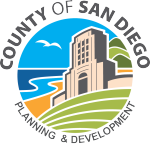Socially Equitable Cannabis Program:
Regulatory Requirements and Licensing & Permitting System Development

ABOUT THE PROGRAM
The County of San Diego is developing the Board-directed Socially Equitable Cannabis Program (SECP), which will allow for a suite of commercial medicinal and adult-use cannabis operations in the unincorporated area of the County. The SECP consists of four main elements: (1) Social Equity Program, (2) Cannabis Regulatory Requirements, (3) Cannabis Licensing and Permitting System, and (4) Cannabis Taxation Program. The Department of Planning and Development Services (PDS) is leading the efforts to develop the Regulatory Requirements and Licensing and Permitting System elements of the SECP.
For additional information about the SECP, please visit the
program’s main webpage here.
CANNABIS REGULATORY REQUIREMENTS
Development of the local regulatory requirements for operating a commercial medical or adult-use cannabis business will include amendments to the County’s Code of Regulatory Ordinances and Zoning Ordinance.
Regulatory Code Update
The Regulatory Code is a set of policies that guides various functions in the County. The Regulatory Code amendments developed for the SECP will outline the requirements for running a medicinal or adult-use cannabis commercial business in the unincorporated County including retail, cultivation, manufacturing, distribution, and testing. Examples of regulatory ordinances include rules about what a retail operation’s signage can look like, what kind of security cannabis facilities must have, and information about who can get a license and how the license can be acquired.
Zoning Ordinance Update
Zoning ordinances regulate land uses in the unincorporated (non-city) portions of the County. Zoning ordinances make sure that activities happen in places suited for them and protect sensitive locations and individuals. The Zoning Ordinance amendments developed for the Program will designate where cannabis operations can take place.
Environmental Review
The PDS Long Range Planning is leading the development of a Program Environmental Impact Report (EIR) to analyze and report potential environmental impacts from the proposed SECP and evaluate possible mitigation under the California Environmental Quality Act (CEQA). The information gathered in the EIR process will inform the ordinance amendments to protect local environmental resources and the health of County residents.
CANNABIS LICENSING AND PERMITTING
The cannabis licensing and permitting system will establish the organizational structure (application framework, review processes) and procedures for obtaining the required County license(s) and permit(s) to operate commercial cannabis businesses. A corresponding fee structure will be established as part of the system’s development.
TIMELINE AND MILESTONES
In October 2022, the Board voted to transition the existing cannabis licensing program for the five non-conforming dispensaries from the Sheriff’s Department to Planning and Development Services (PDS). Starting in December 2022, the PDS Code Compliance Division began oversight of the existing five cannabis facilities as the local licensing entity in the unincorporated areas of San Diego County. Separately, PDS Code Compliance will continue to work with the Sheriff’s Marijuana Enforcement Taskforce to address any complaints of illegal operations.
The overall cannabis licensing and permitting system and land use
regulations for the SECP are currently under development with several
consultants assisting County staff on best practice research and
environmental review. Public outreach for the development of draft
regulations and the EIR is planned to commence in summer 2023. To
receive announcements about upcoming outreach activities, please subscribe to Planning & Development Services -
Cannabis Program email list.









